Slown
On this page, you find all documents, package deals, and flashcards offered by seller Slown.
- 52
- 0
- 0
Community
- Followers
- Following
52 items
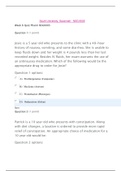
Week 5 discussion with relevant points that will help you study
Week 5 discussion What would you add to the current treatment plan? Why? I would like to rule out any cardiac issue by ECG and labs including CBC, electrolyte, BUN/creatinine, and cardiac enzymes b ecause of the patient’s history of MI and kidney disease. I would also like to check patient’s blood sugar level because beta blockers have the ability to produce hypoglycemia and block the common symptoms of it. Only diaphoresis in hypoglycemia is not blocked by these drugs. I would add amitripty...
- Exam (elaborations)
- • 3 pages •
Week 5 discussion What would you add to the current treatment plan? Why? I would like to rule out any cardiac issue by ECG and labs including CBC, electrolyte, BUN/creatinine, and cardiac enzymes b ecause of the patient’s history of MI and kidney disease. I would also like to check patient’s blood sugar level because beta blockers have the ability to produce hypoglycemia and block the common symptoms of it. Only diaphoresis in hypoglycemia is not blocked by these drugs. I would add amitripty...

NURSING NSG6005Wk2D1 document with relevant points
NURSING NSG6005 Wk2D Gami is a 48-year-old who you discover when completing a health history is taking cinnamon to treat Type II Diabetes. She is specifically using cassia Cinnamon. You also d iscover that she is taking Ginseng to assist with memory. Her prescribed medications are Aricept and Coumadin. Ms. GM is a 48-year-old who presents to your clinic to establish care. During the health history, you learn that she has a history of Type II Diabetes. When asked about prescription and nontraditi...
- Exam (elaborations)
- • 4 pages •
NURSING NSG6005 Wk2D Gami is a 48-year-old who you discover when completing a health history is taking cinnamon to treat Type II Diabetes. She is specifically using cassia Cinnamon. You also d iscover that she is taking Ginseng to assist with memory. Her prescribed medications are Aricept and Coumadin. Ms. GM is a 48-year-old who presents to your clinic to establish care. During the health history, you learn that she has a history of Type II Diabetes. When asked about prescription and nontraditi...
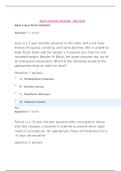
NSG6005 Week 9 Discussion Post with relevant points
NSG6005 Week 9 Discussion Post Angela is a 54-year-old married woman with three adult children. She has been the office manager of a small law firm for 20 years and has enjoyed her work until this p ast year. She has rheumatoid arthritis with minimal impairment that has been managed well with NSAIDs. She has been taking conjugated estrogens for 8 years and decided to stop taking them because of her concern of their risks without sufficient medical benefit. She has tolerated the discontinuation w...
- Exam (elaborations)
- • 3 pages •
NSG6005 Week 9 Discussion Post Angela is a 54-year-old married woman with three adult children. She has been the office manager of a small law firm for 20 years and has enjoyed her work until this p ast year. She has rheumatoid arthritis with minimal impairment that has been managed well with NSAIDs. She has been taking conjugated estrogens for 8 years and decided to stop taking them because of her concern of their risks without sufficient medical benefit. She has tolerated the discontinuation w...
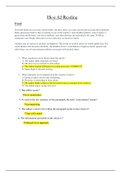
NSG6005Week 4 assignment 1
NSG6005Week 4 assignment 1 Because TJ has unremarkable lab work and vital signs that are within normal limits, differential diagnoses can be narrowed significantly. Because of his history of bleedin g ulcer and multiple risk factors (over age 50, NSAID use, tobacco and alcohol use), and the lack of relief using Zantac, differential diagnoses are peptic ulcer disease (PUD), h. pylori infection, erosive esophagitis, or gastro esophageal reflux disease (GERD). The American College of Gastroenterolo...
- Exam (elaborations)
- • 13 pages •
NSG6005Week 4 assignment 1 Because TJ has unremarkable lab work and vital signs that are within normal limits, differential diagnoses can be narrowed significantly. Because of his history of bleedin g ulcer and multiple risk factors (over age 50, NSAID use, tobacco and alcohol use), and the lack of relief using Zantac, differential diagnoses are peptic ulcer disease (PUD), h. pylori infection, erosive esophagitis, or gastro esophageal reflux disease (GERD). The American College of Gastroenterolo...

WEEK 5 QUIZ (QUESTION 1 TO QUESTION 20)
WEEK 5 QUIZ (QUESTION 1 TO QUESTION 20). Question 1 Which medication classification is generally included in the treatment of silicosis? Student Answer: CORRECT Corticosteroids Antibiotics Bronch odilators Expectorants Instructor Explanation: No specific treatment exists for silicosis, although corticosteroids may produce some improvement in the early, more acute stages. The other options are not generally prescribed. Points Received: 0.5 of 0.5 Comments: Question 2 Which immunoglobulin is prese...
- Exam (elaborations)
- • 10 pages •
WEEK 5 QUIZ (QUESTION 1 TO QUESTION 20). Question 1 Which medication classification is generally included in the treatment of silicosis? Student Answer: CORRECT Corticosteroids Antibiotics Bronch odilators Expectorants Instructor Explanation: No specific treatment exists for silicosis, although corticosteroids may produce some improvement in the early, more acute stages. The other options are not generally prescribed. Points Received: 0.5 of 0.5 Comments: Question 2 Which immunoglobulin is prese...
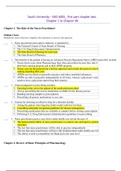
Week1Discussion
Week1Discussion Ms. BD is a 33-year-old G2P1 female who has a history of chronic HTN. She was diagnosed with this in the interim since her first pregnancy, and she has been well controlled with Prin izide 12.5/20 PO BID. Her period, usually very regular, was 5 days late. She performed a home pregnancy test which was positive. She states she feel "OK" but is concerned about both her HTN and her developing fetus. She has no other medical problems, symptoms, or concerns. Assessment: Physical exam...
- Exam (elaborations)
- • 70 pages •
Week1Discussion Ms. BD is a 33-year-old G2P1 female who has a history of chronic HTN. She was diagnosed with this in the interim since her first pregnancy, and she has been well controlled with Prin izide 12.5/20 PO BID. Her period, usually very regular, was 5 days late. She performed a home pregnancy test which was positive. She states she feel "OK" but is concerned about both her HTN and her developing fetus. She has no other medical problems, symptoms, or concerns. Assessment: Physical exam...
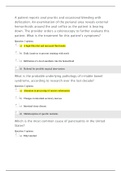
NSG 6001 Midterm Exam 2
1. A 35 year old female arrives at your clinic. She has had diabetes and peripheral artery disease for the past 5 years. You decide to obtain an ETT. The insurance company argues that this is inappr opriate. You justify the ETT because you are planning secondary strategies to prevent future heart disease. Where could one find the supporting data for these guidelines? 2. You are counseling a patient diagnosed with stress-induced ischemia. You base your discussion on your knowledge that stress-ind...
- Exam (elaborations)
- • 3 pages •
1. A 35 year old female arrives at your clinic. She has had diabetes and peripheral artery disease for the past 5 years. You decide to obtain an ETT. The insurance company argues that this is inappr opriate. You justify the ETT because you are planning secondary strategies to prevent future heart disease. Where could one find the supporting data for these guidelines? 2. You are counseling a patient diagnosed with stress-induced ischemia. You base your discussion on your knowledge that stress-ind...
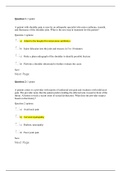
NSG 6001 Week 5 Knowledge Check questions and answers
1. A patient with shoulder pain is seen by an orthopedic specialist who notes erythema, warmth and fluctuance of the shoulder joint. What is the next step in treatment for this patient? 2. A patien t comes to a provider with reports of unilateral arm pain and weakness with mild neck pain. The provider notes that the patient prefers holding the affected arm crossed in front of the throat. A history reveals a recent onset of sexual dysfunction. What does the provider suspect based on this history?...
- Exam (elaborations)
- • 3 pages •
1. A patient with shoulder pain is seen by an orthopedic specialist who notes erythema, warmth and fluctuance of the shoulder joint. What is the next step in treatment for this patient? 2. A patien t comes to a provider with reports of unilateral arm pain and weakness with mild neck pain. The provider notes that the patient prefers holding the affected arm crossed in front of the throat. A history reveals a recent onset of sexual dysfunction. What does the provider suspect based on this history?...
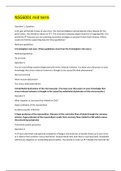
NSG 6001 Midterm Exam 1 Questions and Answers
1. A 35 year old female arrives at your clinic. She has had diabetes and peripheral artery disease for the past 5 years. You decide to obtain an ETT. The insurance company argues that this is inappr opriate. You justify the ETT because you are planning secondary strategies to prevent future heart disease. Where could one find the supporting data for these guidelines? 2. You are counseling a patient diagnosed with stress-induced ischemia. You base your discussion on your knowledge that stress-ind...
- Exam (elaborations)
- • 9 pages •
1. A 35 year old female arrives at your clinic. She has had diabetes and peripheral artery disease for the past 5 years. You decide to obtain an ETT. The insurance company argues that this is inappr opriate. You justify the ETT because you are planning secondary strategies to prevent future heart disease. Where could one find the supporting data for these guidelines? 2. You are counseling a patient diagnosed with stress-induced ischemia. You base your discussion on your knowledge that stress-ind...
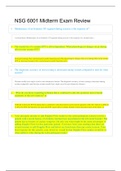
NSG 6001 Midterm Exam Review Questions and Answers
Maintenance of an Isometric ST-segment during exercise is the response of? The sensitivity of a routine ETT is effort dependent. What physiological changes occur during effort in the routine ETT? Th e diagnostic accuracy of stress testing is ……among women compared to men for what reasons? What do you know regarding ischemia that is …..to only the posterior and or lateral segments of the left ventricle? Your preceptor decides to add Doppler Flow studies to the echocardiogram exercise test f...
- Exam (elaborations)
- • 6 pages •
Maintenance of an Isometric ST-segment during exercise is the response of? The sensitivity of a routine ETT is effort dependent. What physiological changes occur during effort in the routine ETT? Th e diagnostic accuracy of stress testing is ……among women compared to men for what reasons? What do you know regarding ischemia that is …..to only the posterior and or lateral segments of the left ventricle? Your preceptor decides to add Doppler Flow studies to the echocardiogram exercise test f...
